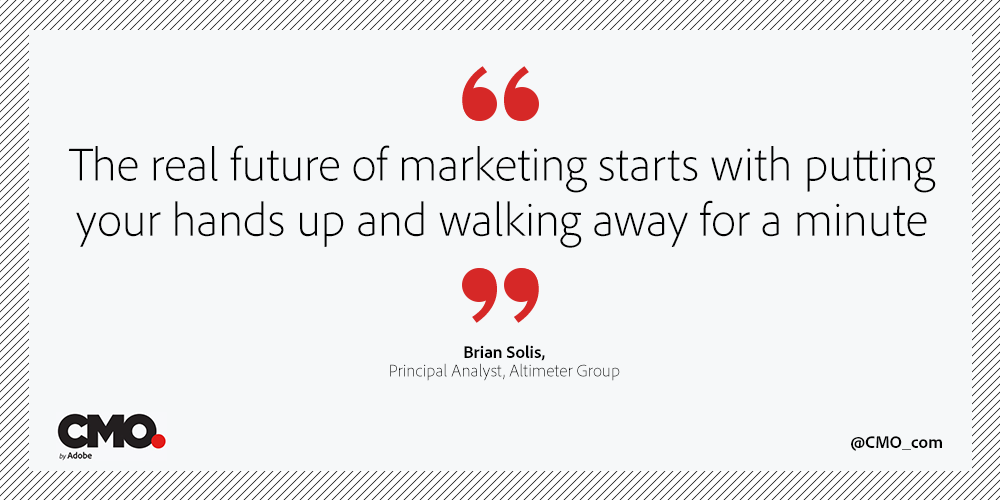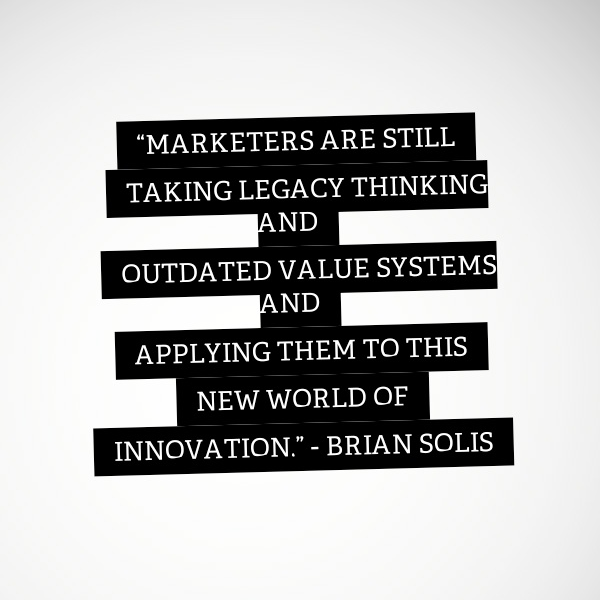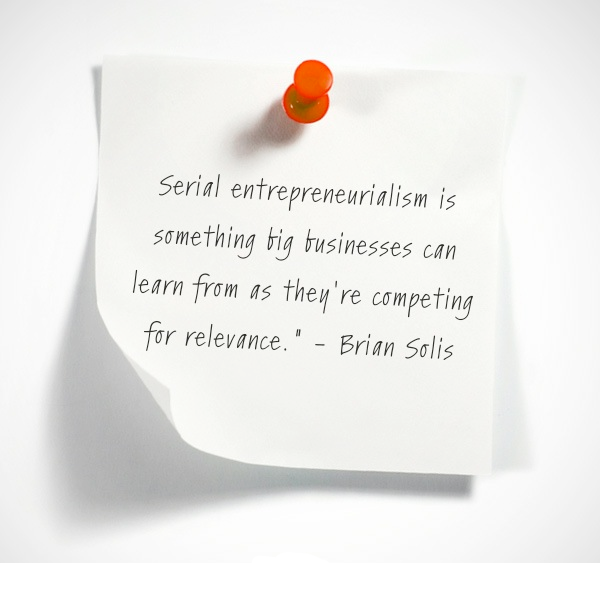The Adobe Summit in London is a pretty special event to me. A big part of it of course has to do with its location. I adore London and all of my friends, and those I’ve yet to meet, make the trip special each time. The other reason is that Adobe’s platform reaches EMEA and thus helps marketers who are pushing for change on a global scale.
To prepare for the event, the team at CMO.com asked me to share my thoughts on the state and future of marketing. Maybe it was because the call took place at 6 a.m. my time or maybe I was just in the mood to share the truth, warts and all. Either way, here is the full interview. I hope it helps you…
Solis: Pardon my bluntness, but the future of marketing is screwed. The innovation in technology and the socialisation of media is becoming pervasive, but it’s making it easy to do all of the things wrong that have been part of the problem of marketing for years; scale and mass broadcasting and the dumbing down of strategies.
Marketers are putting all their resources against what were traditionally the big things: big commercials, big campaigns, celebrity endorsements. We’re still taking legacy thinking and outdated value systems and applying them to this new world of innovation.
The real future of marketing starts with putting your hands up and walking away for a minute. With understanding how technology has affected behaviour and how that behaviour has affected expectations and values and decision-making.
And when you understand what is different today – all this amazing technology, all the data you can leverage – you recognise the future of marketing starts with an entirely new philosophy about what marketing should or could be. Marketing becomes a true reflection of an always-on society by recognising that it’s not a department. Marketing is now a way of business.
And when I use the word marketing, I’m talking about engagement, understanding who the customer is, how they’re different than customers before, what the context of their engagement is. Then building a digital infrastructure, and a complementary real-world infrastructure, to deliver an entirely new and meaningful experience.

CMO.com: How do you start?
Solis: The biggest challenge is not in the understanding or expertise associated with new technology. We can learn that. The biggest problem is our inability to recognise that the experience we have today is not the experience we need going forward.
We have to swallow our pride and recognise that, in order to compete for the future, we’ve got to become a student again. That’s the place I consistently see where no one wants to start. It’s Tolstoy’s quote about how we all talk of change but none of us talk about changing ourselves.
An easier way to answer your question is that you start by understanding the digital customer experience. What does it look like? What are the touch points? What are the screens that people use? What are the frustrations they have? Where did they find success? Immersing yourself – in a social science way – in a digital customer experience is a great start.
I have a statistic that shows 88 percent of companies are going through a digital transformation to better understand the digital customer experience and better meet the needs of the digital customer. That’s almost every company.
Then I learned only 25 percent actually studied the digital customer experience and only 12 percent actually immersed themselves in it. So 88 percent of companies are spending all this money to change digitally but only 25 percent could tell you why.
CMO.com: Does that mean the others are bound to fail?
Solis: I refer to this as digital Darwinism; as technology and society evolve, so must we. Trying to change may or may not be good enough, but digital Darwinism seems to favour those companies that at least try. It might buy them some time. But this is where innovation comes in, because companies have a lot of threats today that they’re not acknowledging.
For example, we view our competition as the competitors we’ve always had; we look at what they do and we try to up the ante. But disruption is happening just as a result of innovation. The taxi industry felt very comfortable in providing mediocre, sub-standard services until Uber came out. They never saw disruption as a competitive threat; they saw competitive taxi companies or black car services or limousines as a threat. Uber better understood the digital customer and what they wanted, and created a product around that. And it was a success because people could inherently embrace it.
Then there’s millennials. They’re different as customers but they’re also different as employees. Companies typically have horrible cultures, built on models from the 1950s and 1960s. There’s no intrepreneurial or entrepreneurial spirit to really motivate younger people, to create places they can relate to and where they’re appreciated. This is creating potential disruption.
Then you have soaring scholastic debts due to the university system. You have the dramatic rise of prices in homes. You have the rise of the sharing economy. All of these things are contributing to create different consumer value systems: “Do I need to own this?” “Do I need to spend the extra money for a luxury good?” “Does that really reflect who am I to who I’m trying to be?”

All of these dynamics are crashing in on organisations, and so just trying to change might be enough in some areas but it’s sorely lacking elsewhere. At some point you’re just consumed by the crashing waves.
What we need right now is a leader, and marketing is a great place to start. But just turning on these new machines doesn’t help us, being more creative or louder doesn’t help us. What helps is understanding how to be more human. Using technology to scale humanity is exactly where the future of marketing begins.
CMO.com: A number of big organisations are investing in funds or setting up incubators to work with emerging businesses.
Solis: That’s a fantastic place to begin. Many companies are opening up incubators to facilitate new technology as a way of fostering disruption. They’re trying intentionally to put themselves out of business. Others are investing in outside accelerators, incubators or in VC funds as a way of nurturing these opportunities.
The challenge happens when they identify new technology and bring it into the existing machine, whether or not that technology is strong enough to be supported by the existing broken models.
Culturally, this is a big challenge. When you find people or technology, how can they be scaled successfully without becoming part of the problem? Entrepreneurs don’t start companies because they dream of being inside a big company. They want to change the world, and that doesn’t go away because they’ve finished one product. Serial entrepreneurialism is something else big businesses can learn from as they’re competing for relevance.
That’s a long way of saying that innovating in your own disruption is counter-intuitive but incredibly productive. But you also need to invest in your culture to be innovative and adaptive, to form new decision-making processes for a real-time world, processes that are less political and less tied to self-preservation but are about becoming a start-up inside a big company.

CMO.com: I’m fascinated by your ideas of the human algorithm and the human API. Can you expand on them for me?
Solis: We hear marketers speaking about big data as if it’s a gold mine. They’re plugging in big data and hiring data scientists as if this was the solution to everybody’s problem.
The human algorithm was this idea that data has to tell a story, and that story has to be meaningful and compelling to different audiences within the organisation. That takes someone not just to understand the data, but to humanise it so that you can see challenges and opportunities.
Today organisations are sluggish in the way they absorb data and act on it. The human algorithm to me was an infrastructure that could be built within the marketing organisation to drive specific change, to iterate and innovate at the same time.
The human API was a much more sophisticated understanding of the human being as a platform. On the business side of things, the signals being produced by big data aren’t necessarily becoming humanised. Instead we get caught up in the technology so we create more products, more wearables, more internet of things. Everyone of these is controlled by its own app, so things become incredibly complicated.
The human API was a different philosophy, saying take the technology out for a moment. What if the person was the platform? How would you design an experience based on what you’re learning from them? How could you make a much more intuitive experience, whether it’s the relationship between them and a product or between them and an ecosystem?
The Apple Watch is taking this approach. It’s not saying you need a watch or you need yet another wearable device. It’s thinking about why you would wear a wearable device. What are you trying to do, and what do you not know you can do? And at the same time we’re going to plug you in to the Apple ecosystem. That’s the idea of the human API.

CMO.com: Another emerging theme is that because marketing is the most customer-facing bit of the organisation, it’s perfectly placed to relay customer wants and needs back to the organisation in a better way. Marketing becomes central to the company’s operation.
Solis: It’s positioned appropriately. It’s not staffed appropriately, nor is it recognised or funded appropriately today. But it is well-positioned and it will become much more significant within the organisation, with greater responsibilities and accountabilities. It starts to drive product road maps. It starts to drive employee engagement. It starts to drive culture. It starts to drive the customer experience including customer service and loyalty.
To me, the marketing organisation could become the most powerful form of the organisation, a new model which everything else could branch from.
SOURCE: Brian Solis

No comments:
Post a Comment